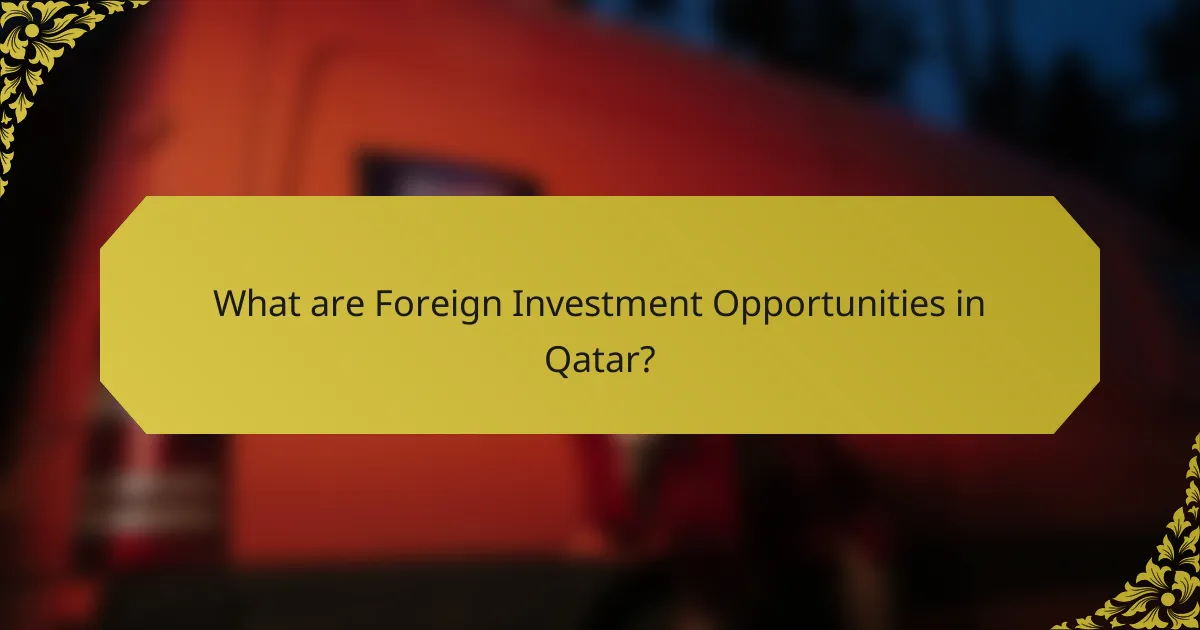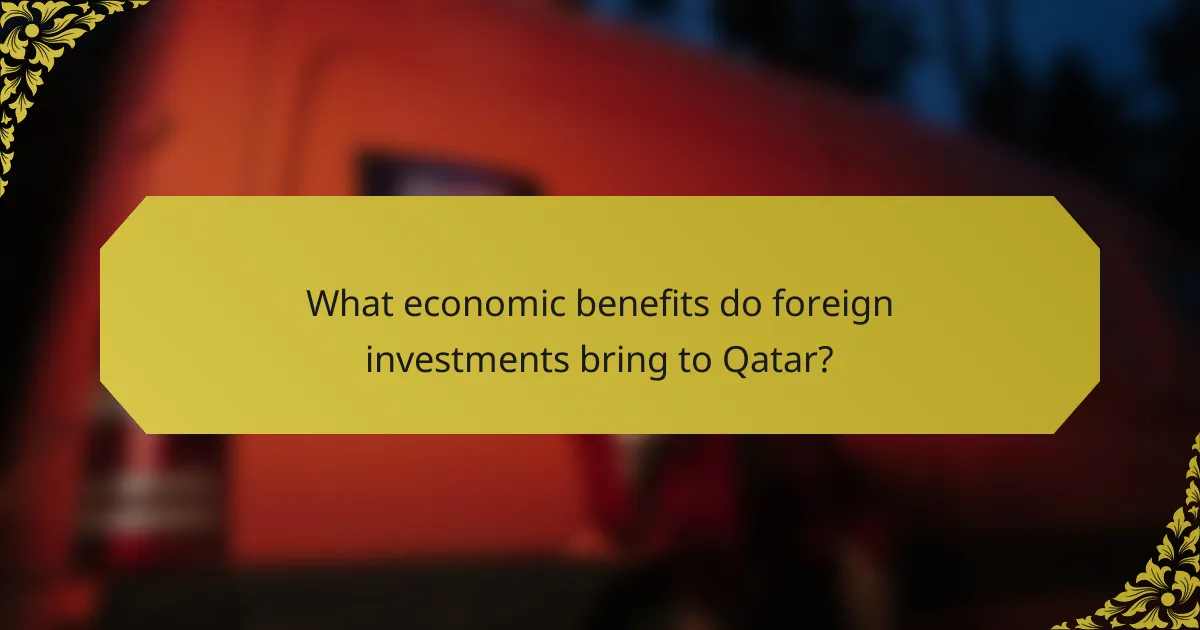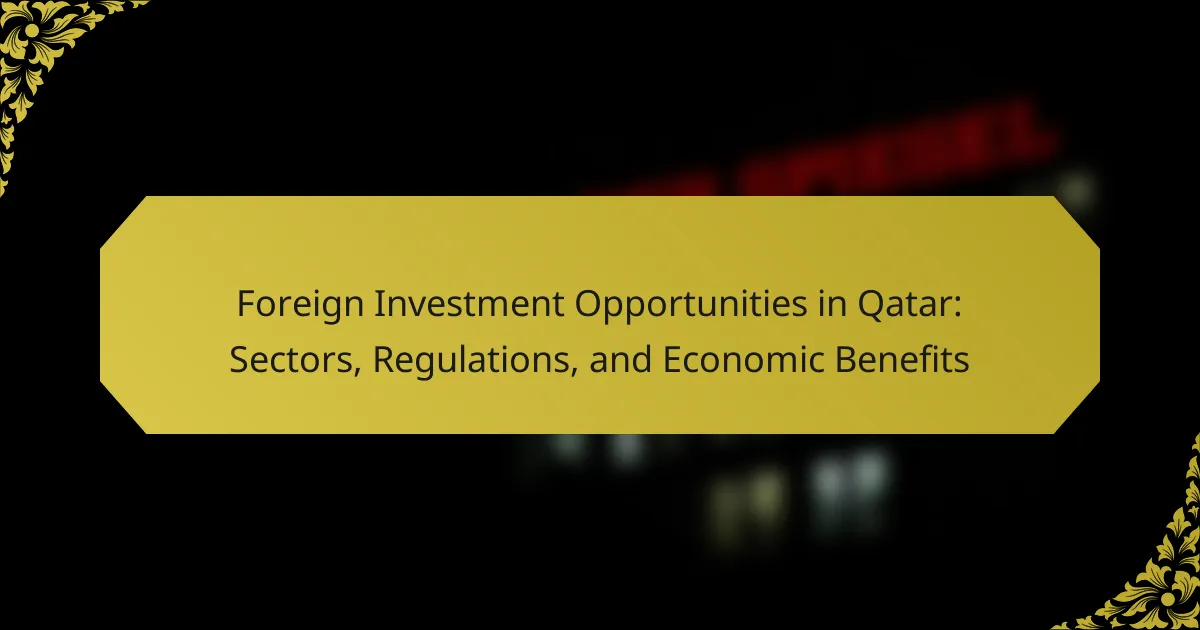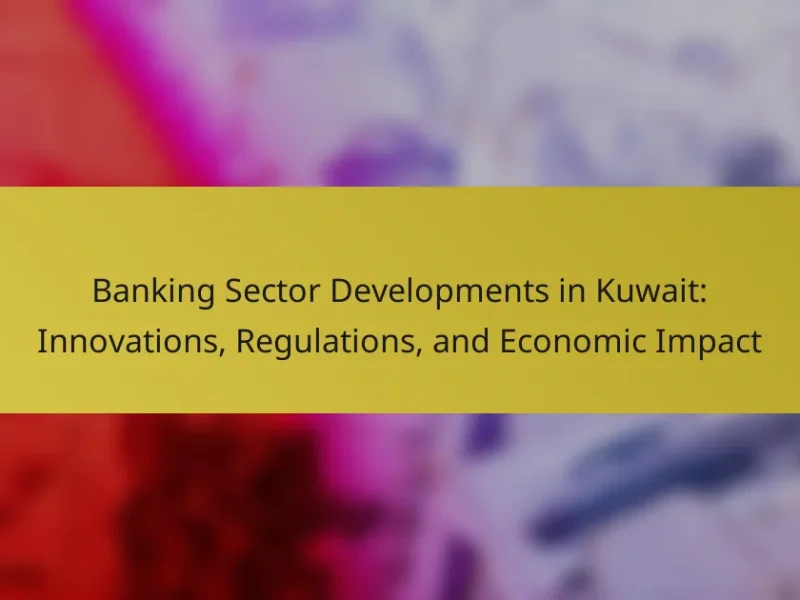
What are Foreign Investment Opportunities in Qatar?
Foreign investment opportunities in Qatar are diverse and robust. Key sectors include energy, real estate, tourism, and technology. The Qatari government encourages foreign investment through various incentives. These include tax exemptions and 100% foreign ownership in certain sectors. Qatar’s economy is one of the fastest-growing globally, with a GDP growth rate of 4.5% in 2022. The country has established free zones to attract foreign businesses. Additionally, Qatar offers a stable political environment and strong infrastructure. These factors make it an attractive destination for foreign investors.
How have foreign investments shaped Qatar’s economy?
Foreign investments have significantly shaped Qatar’s economy by diversifying its revenue sources. The influx of foreign capital has accelerated the development of various sectors, including real estate, energy, and infrastructure. For instance, Qatar’s GDP growth rate has been bolstered by foreign direct investment (FDI) inflows, which reached approximately $1.6 billion in 2020. Such investments have facilitated technology transfer and skill development within the local workforce. Additionally, foreign investments have enhanced Qatar’s global competitiveness, attracting more businesses and fostering innovation. The government’s initiatives, such as the Qatar Investment Authority, aim to further attract international investors. Overall, foreign investments have played a crucial role in transforming Qatar into a regional economic hub.
What key statistics illustrate foreign investment trends in Qatar?
Foreign investment in Qatar has shown significant growth in recent years. In 2022, Qatar attracted approximately $25 billion in foreign direct investment (FDI). This figure represents a 10% increase from the previous year. The energy sector remains the most attractive, accounting for around 60% of total FDI. The construction and real estate sectors also drew considerable investment, reflecting Qatar’s ongoing development projects. According to the Qatar Financial Centre, the country aims to increase FDI to $50 billion by 2030. Additionally, the government has implemented various reforms to enhance the investment climate, such as allowing 100% foreign ownership in some sectors. These statistics illustrate a strong trend towards increased foreign investment in Qatar.
How does Qatar compare to other Gulf Cooperation Council (GCC) countries in attracting foreign investment?
Qatar ranks among the top Gulf Cooperation Council (GCC) countries in attracting foreign investment. It offers a stable economic environment, significant natural gas reserves, and a strategic location. In 2021, Qatar’s foreign direct investment inflows reached approximately $1.8 billion. This positions Qatar favorably compared to its GCC peers, such as Kuwait and Oman, which attract lower levels of foreign investment. Qatar’s investment climate is enhanced by regulatory reforms and initiatives like the Qatar Investment Authority. The country also benefits from a strong infrastructure and a growing market. These factors collectively contribute to its competitive edge in the GCC region.
What sectors in Qatar are most attractive for foreign investors?
The sectors in Qatar that are most attractive for foreign investors include energy, real estate, tourism, and technology. The energy sector is driven by natural gas and oil production, which are critical to Qatar’s economy. The real estate sector offers opportunities due to ongoing infrastructure projects and the 2022 FIFA World Cup developments. The tourism sector is expanding, supported by government initiatives to increase visitor numbers. The technology sector is growing rapidly, with a focus on digital transformation and innovation. These sectors are bolstered by Qatar’s favorable investment climate and regulatory framework, which encourages foreign participation.
Which industries are prioritized by the Qatari government for foreign investment?
The Qatari government prioritizes several industries for foreign investment. These include energy, particularly natural gas and renewable energy. The government also emphasizes infrastructure development, including transportation and construction. Healthcare and education are other key sectors attracting foreign capital. Additionally, the technology and telecommunications industries are being promoted for investment. These priorities align with Qatar’s National Vision 2030, which aims to diversify the economy and enhance sustainable development. This strategic focus is supported by various initiatives and incentives to attract foreign investors.
How do infrastructure projects influence foreign investment opportunities?
Infrastructure projects significantly enhance foreign investment opportunities. They improve transportation, utilities, and communication systems. This leads to a more efficient business environment. Improved infrastructure reduces operational costs for foreign companies. It also increases access to markets and resources. For instance, Qatar’s investments in roads and ports have attracted multinational corporations. According to the World Bank, countries with strong infrastructure see 40% more foreign direct investment. Therefore, infrastructure development is crucial for attracting foreign investments.
What regulations govern foreign investment in Qatar?
Foreign investment in Qatar is primarily governed by the Foreign Investment Law No. 1 of 2019. This law allows foreign investors to own up to 100% of businesses in certain sectors. It also outlines the procedures for obtaining investment licenses. The law aims to attract foreign capital and promote economic diversification. Additionally, the Qatar Financial Centre provides a regulatory framework for foreign investments. This framework includes specific provisions for financial services and related activities. The government has established various free zones to enhance foreign investment opportunities. These zones offer incentives such as tax exemptions and customs duty waivers. Overall, Qatar’s regulatory environment is designed to foster a welcoming atmosphere for foreign investors.
What are the key laws and policies affecting foreign investments?
The key laws and policies affecting foreign investments in Qatar include the Foreign Investment Law and the Investment Promotion Law. The Foreign Investment Law allows 100% foreign ownership in many sectors. This law aims to attract foreign capital and expertise to Qatar’s economy. The Investment Promotion Law provides incentives such as tax exemptions and customs duty exemptions. These policies enhance the investment climate and encourage foreign investors. Additionally, Qatar’s commitment to economic diversification supports foreign investment. The Qatar Financial Centre also offers a favorable legal framework for businesses. These laws collectively create a robust environment for foreign investments in Qatar.
How do ownership restrictions impact foreign investors in Qatar?
Ownership restrictions in Qatar limit foreign investors’ ability to fully own businesses. These restrictions typically require a local partner to hold a majority stake in certain sectors. This can deter foreign investment due to concerns over control and profit-sharing. Specific ownership limits vary by industry, with some sectors allowing up to 100% foreign ownership. However, in strategic sectors like telecommunications and energy, foreign ownership is often capped at 49%. Such limitations can affect foreign investors’ decision-making and operational flexibility. Additionally, the requirement for a local partner may lead to challenges in alignment of business goals. Overall, ownership restrictions can create barriers that foreign investors must navigate in Qatar’s market.

What economic benefits do foreign investments bring to Qatar?
Foreign investments bring significant economic benefits to Qatar. They enhance economic diversification beyond oil and gas. Foreign capital contributes to infrastructure development, improving transportation and utilities. Job creation is another critical benefit, as investments lead to new employment opportunities. Increased foreign direct investment (FDI) stimulates local businesses and encourages entrepreneurship. The influx of technology and expertise boosts innovation in various sectors. Additionally, foreign investments can lead to improved trade relationships and access to international markets. According to the Qatar Financial Centre, FDI inflows reached $1.2 billion in 2020, demonstrating the growing investor confidence in the Qatari economy.
How do foreign investments contribute to job creation in Qatar?
Foreign investments significantly contribute to job creation in Qatar by stimulating economic growth. They attract capital that funds new projects and businesses. These investments lead to the establishment of various sectors, including construction, healthcare, and technology. As new companies emerge, they create direct employment opportunities. For instance, the Qatar Investment Authority reports that foreign investments have generated thousands of jobs in recent years. Additionally, foreign companies often require local suppliers and services, further increasing job opportunities. The influx of foreign talent also enhances the local workforce’s skills. Overall, foreign investments play a crucial role in diversifying Qatar’s economy and reducing unemployment.
What types of jobs are generated through foreign investment projects?
Foreign investment projects generate various types of jobs, including skilled, semi-skilled, and unskilled positions. Skilled jobs often include roles in management, engineering, and IT. Semi-skilled jobs may involve technical support and administrative positions. Unskilled jobs can encompass roles in construction and maintenance.
These projects also create indirect employment opportunities. For instance, they can boost local supply chains and service sectors. According to the Qatar Economic Forum, foreign investments have led to a significant increase in job creation across multiple sectors. In 2021, it was reported that foreign direct investment in Qatar contributed to over 20,000 new jobs.
How does job creation affect the local economy and workforce development?
Job creation positively impacts the local economy and workforce development. It leads to increased consumer spending, which stimulates local businesses. More jobs mean higher disposable income for residents. This, in turn, can enhance demand for goods and services. Additionally, job creation fosters workforce development by providing training and skill enhancement opportunities. Employers often invest in their employees’ education to improve productivity. According to the Qatar National Development Strategy, job creation is essential for sustainable economic growth. It supports the diversification of the economy, reducing reliance on oil and gas sectors. This diversification strengthens the overall resilience of the local economy.
What impact do foreign investments have on Qatar’s GDP?
Foreign investments significantly boost Qatar’s GDP. They contribute to economic diversification and infrastructure development. In 2021, foreign direct investment inflows reached approximately $2.7 billion. This influx supports various sectors, including real estate, energy, and finance. Additionally, foreign investments create job opportunities, enhancing consumer spending. Increased economic activity leads to higher GDP growth rates. The Qatari government actively promotes foreign investments through favorable regulations. Overall, foreign investments play a crucial role in shaping Qatar’s economic landscape.
How are foreign investments linked to economic diversification in Qatar?
Foreign investments are crucial to economic diversification in Qatar. They provide capital that supports the growth of various sectors beyond oil and gas. This capital infusion encourages the development of industries such as tourism, finance, and technology. For instance, Qatar’s National Vision 2030 aims to reduce dependence on hydrocarbons. The government actively seeks foreign partnerships to achieve this goal. Statistics show that foreign direct investment (FDI) inflows reached approximately $2.1 billion in 2021. This investment fosters innovation and job creation, further enhancing economic resilience. Overall, foreign investments play a significant role in shaping a diversified economic landscape in Qatar.
What role do foreign investments play in achieving Qatar National Vision 2030?
Foreign investments are crucial for achieving Qatar National Vision 2030. They provide essential capital for infrastructure development. This investment supports economic diversification away from oil dependency. Foreign investments enhance technology transfer and innovation in various sectors. They also create jobs and foster local entrepreneurship. The Qatar Investment Authority actively seeks global partnerships to attract foreign capital. In 2021, Qatar ranked among the top 10 global destinations for foreign direct investment. This trend is integral to realizing the goals outlined in Qatar National Vision 2030.
What challenges do foreign investors face in Qatar?
Foreign investors in Qatar face several challenges. One significant challenge is navigating the regulatory environment. The legal framework can be complex and varies across sectors. Additionally, foreign ownership restrictions exist in certain industries. Bureaucratic processes may lead to delays in obtaining necessary permits. Cultural differences can also pose challenges in business negotiations. Limited transparency in some aspects of the market can hinder decision-making. Furthermore, competition from local firms may impact foreign investors’ market entry. These factors collectively create a challenging landscape for foreign investment in Qatar.
What are common barriers to entry for foreign investors in the Qatari market?
Common barriers to entry for foreign investors in the Qatari market include regulatory restrictions, limited market access, and high capital requirements. Foreign ownership limitations often restrict investment in certain sectors. Bureaucratic processes can delay business setup and operational permits. Cultural differences may pose challenges in negotiations and partnerships. Additionally, the competitive landscape can be difficult to navigate for newcomers. Economic fluctuations can also impact investment stability. These factors collectively create a challenging environment for foreign investors in Qatar.
How can foreign investors navigate regulatory complexities in Qatar?
Foreign investors can navigate regulatory complexities in Qatar by understanding local laws and engaging with legal experts. They should familiarize themselves with the Qatar Investment Authority (QIA) guidelines. The QIA provides resources and support for foreign investments. Investors must also comply with the Foreign Investment Law, which outlines ownership restrictions and sector-specific regulations. Engaging with the Qatar Chamber of Commerce can provide insights into business practices. Additionally, attending investment forums can help build connections with local partners. Utilizing local legal counsel ensures adherence to the regulatory framework. Overall, a proactive approach and local partnerships facilitate smoother navigation of Qatar’s regulatory landscape.

What best practices should foreign investors follow in Qatar?
Foreign investors in Qatar should conduct thorough market research. Understanding local market dynamics is crucial for success. They must also comply with Qatar’s legal and regulatory framework. This includes obtaining necessary licenses and permits. Engaging with local partners can provide valuable insights and facilitate operations. Investors should consider cultural factors in their business strategies. Building strong relationships with stakeholders is essential for long-term success. Additionally, foreign investors should stay informed about economic trends and government policies. These practices enhance investment outcomes and mitigate risks in the Qatari market.
How can foreign investors identify suitable partners in Qatar?
Foreign investors can identify suitable partners in Qatar by leveraging local business networks and resources. Engaging with the Qatar Chamber of Commerce can provide valuable connections. Attending industry events and trade fairs in Qatar can also facilitate networking. Utilizing online platforms like LinkedIn helps in identifying potential partners. Conducting thorough market research is essential to understand the local business landscape. Consulting with local legal and financial advisors ensures compliance with regulations. The Qatar Financial Centre offers resources for foreign businesses seeking partnerships. These methods enhance the chances of finding reliable local partners.
What resources are available for foreign investors seeking local partnerships?
Foreign investors seeking local partnerships in Qatar can access several resources. The Qatar Financial Centre provides legal and regulatory frameworks for foreign investment. The Qatar Chamber of Commerce offers networking opportunities and business support services. The Ministry of Commerce and Industry facilitates foreign investment through various initiatives. Additionally, local business incubators and accelerators provide mentorship and resources for startups. The Qatar Development Bank offers financing options for joint ventures. These resources collectively support foreign investors in establishing successful local partnerships.
What strategies can enhance the success of foreign investments in Qatar?
Establishing strong partnerships with local businesses enhances the success of foreign investments in Qatar. Collaborating with local entities provides valuable market insights and networks. Understanding Qatar’s regulatory framework is crucial for compliance and operational efficiency. Adapting to local customs and business practices fosters trust and facilitates smoother transactions. Engaging with government initiatives, such as Qatar’s National Vision 2030, aligns investments with national priorities. Conducting thorough market research identifies high-potential sectors and mitigates risks. Additionally, leveraging Qatar’s strategic location can enhance trade opportunities within the region. These strategies collectively contribute to a more favorable investment environment.
How important is understanding the cultural context for foreign investors?
Understanding the cultural context is crucial for foreign investors. Cultural awareness influences business negotiations and relationships. In Qatar, local customs and traditions play a significant role in the business environment. For example, understanding the importance of hospitality can enhance trust and rapport. Additionally, cultural missteps can lead to misunderstandings and lost opportunities. Research shows that companies with cultural competence are more successful in international markets. A study by the Harvard Business Review indicates that cultural intelligence can improve negotiation outcomes by up to 30%. Therefore, grasping the cultural context is essential for effective foreign investment in Qatar.
What role does networking play in successful foreign investments in Qatar?
Networking plays a crucial role in successful foreign investments in Qatar. It facilitates connections between investors and local businesses, government officials, and industry leaders. These connections help investors understand the market dynamics and regulatory landscape. Networking also provides access to valuable insights and opportunities that may not be publicly available. Additionally, strong relationships can lead to partnerships that enhance credibility and trust. According to the Qatar Financial Centre, effective networking is essential for navigating the local business environment. It enables investors to leverage local expertise and resources, which can significantly improve investment outcomes.
Foreign Investment Opportunities in Qatar encompass a range of sectors, including energy, real estate, tourism, and technology, supported by government incentives such as tax exemptions and 100% foreign ownership in specific industries. The article explores how foreign investments have transformed Qatar’s economy, enhancing GDP growth and job creation while diversifying revenue sources. Key statistics illustrate investment trends, with Qatar attracting approximately $25 billion in foreign direct investment in 2022. Additionally, the regulatory landscape, ownership restrictions, and best practices for foreign investors are examined to provide a comprehensive understanding of the investment climate in Qatar.


